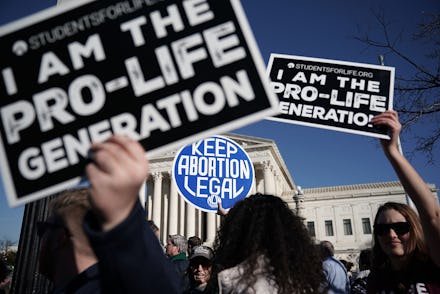Justice Anthony Kennedy is retiring, and now a woman’s right to abortion could be in jeopardy

Supreme Court Justice Anthony Kennedy confirmed Wednesday what had already been long-rumored in Washington, D.C.: his plans to retire.
In a letter submitted to President Donald Trump, Kennedy — who is, at 81, the longest-serving current member of the Supreme Court — said it has been “the greatest honor and privilege to serve our nation in the federal judiciary for 43 years, 30 of those years on the Supreme Court.”
The vacancy on the bench that the Ronald Reagan-appointed justice leaves behind will give Trump his second opportunity to nominate a Supreme Court justice. His first appointment, Neil Gorsuch, has already served as a crucial conservative swing vote in several major decisions, including this week’s contentious ruling that upheld Trump’s travel ban on five Muslim-majority countries.
If Trump successfully installs another conservative judge to the nation’s highest court, several of the key votes that Kennedy helped to push through in 5-4 decisions are likely in jeopardy — including preserving Roe v. Wade, the 1973 landmark decision that enshrined a woman’s right to an abortion on the national level.
Progressives have reason to be concerned: When asked outright during 2016 a presidential debate with Democratic opponent Hillary Clinton if he’d like to see Roe v. Wade overturned, Trump said if he became president and began nominating justices, it would be all but inevitable.
“Because I am pro-life, and I will be appointing pro-life judges, I would think that will go back to the individual states,” Trump said. “If we put another two, three justices on, that will happen... that will happen automatically, in my opinion, because I am putting pro-life justices on the court.”
Roe v. Wade isn’t just embattled at the federal level; state legislators have been chomping at the bit to erode the decision for years. In March, Mississippi lawmakers passed a law banning abortions after 15 weeks. In May, Iowa Gov. Kim Reynolds signed an even more restrictive anti-abortion “heartbeat” bill into law, which bans abortions as soon as a fetal heartbeat has been detected, at about six weeks of gestation.
That bill has been in the news before. In January 2017, Iowa Rep. Steve King — a staunch pro-life advocate and the bill’s chief architect — introduced it at the federal level. Although he conceded that the legislation was a political long shot at the time, he added a caveat: maybe not for long.
“By the time we march this thing down to the Supreme Court, the faces on the bench will be different,” King told reporters at the time. “We just don’t know how much different, but I’m optimistic.”